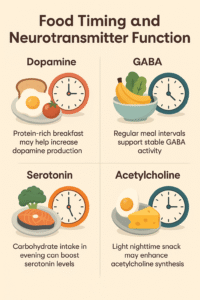Does when you eat matter as much as what you eat? Emerging science suggests that your eating schedule profoundly influences neurotransmitter activity. In fact, strategic food timing can enhance focus, mood, sleep, and even stress resilience by modulating levels of dopamine, serotonin, GABA, and acetylcholine.
The Science of Nutrient Timing
Your body doesn’t process food the same way throughout the day. Circadian rhythms regulate everything from insulin sensitivity to enzyme activity and neurotransmitter synthesis. Eating at inconsistent times—or skipping meals—can disrupt these rhythms, impairing neurotransmitter balance.
Morning: Boost Dopamine and Acetylcholine
- A high-protein breakfast (e.g., eggs, tofu, Greek yogurt) increases levels of tyrosine and choline, precursors to dopamine and acetylcholine.
- Research shows that morning protein intake enhances alertness and working memory. Source: Wurtman et al., 2003
Afternoon: Balance GABA and Maintain Energy
- A balanced lunch with complex carbs, vegetables, and lean protein sustains GABA production and energy levels.
- Avoid simple sugars, which can lead to a dopamine crash and irritability. Source: Benton, 2002
Evening: Enhance Serotonin and Sleep Quality
- Complex carbohydrates increase tryptophan absorption, which converts into serotonin and melatonin, aiding sleep. Source: Fernstrom & Wurtman, 1971
- A light dinner with sweet potatoes, lentils, and leafy greens supports calm and relaxation.
Fasting, Meal Skipping & Brain Chemistry
- Intermittent fasting may increase BDNF (brain-derived neurotrophic factor) and dopamine receptor sensitivity, but can suppress serotonin in some individuals. Source: Longo & Panda, 2016
- Consistent eating windows improve neurotransmitter rhythm and hormone balance.
Practical Takeaways
- Eat protein-rich meals early in the day to prime dopamine and acetylcholine
- Use complex carbs in the evening to support serotonin
- Avoid skipping meals if you’re prone to anxiety or low mood
- Respect your body’s natural clock by maintaining a regular eating schedule
